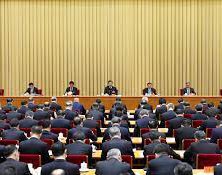China will shift focus to boosting growth after years of COVID-19 restrictions. In particular, “expanding domestic demand” will play a significant role, the Center for China and Globalization, a Beijing-based think tank, said. The shift comes with much of China grappling with what appears to be a brutal COVID-19 surge: Though the authorities have acknowledged few fatalities, major cities’ health care facilities and morgues appear overwhelmed. [Full text & analysis: Central Economic Work Conference 2022- pekingnology.com]
Full text & analysis: Central Economic Work Conference 2022
"Starting with improving psychological expectations in society and boosting confidence in development”: private economy, tech companies, real estate, Comprehensive and Progressive Agreement for Trans-Pacific Partnership (CPTPP), foreign investment, etc.
Every mid-December, China holds the Central Economic Work Conference that offers the fullest clue to its “economic work” for next year.
Since this is the world’s second-largest economy’s economic blueprint for 2023, you can expect it to be very, very long: many takeaways before the full translation of the readout (CN) published by Xinhua:
- China obviously will miss this year’s economic growth target. Numbers from the last few months are particularly frustrating. Covid-19 is spreading fastly in Beijing and other cities after an abrupt and dramatic relaxation of restrictions in place for almost three years. So the confidence is low.
That’s why the readout emphasizes “starting with improving psychological expectations in society and boosting confidence in development.” And “boost market confidence.”
- Amid the wide perception that China has been favoring the state sector at the cost of the private sector in recent years, the readout dedicates one entire paragraph to saying China stands firm behind the development of the private economy. (There are five comparable paragraphs, each emphasizing one particular point.)
Effective implementation of "the "Two Unswervings" [of consolidating and developing the public sector and encouraging, supporting and guiding development of the non-public sector].” In response to the incorrect comments on whether we adhere to "the "Two Unswervings" in society, we must make our attitude clear and unambiguous. We must deepen the reform of state-owned enterprises and improve their core competitiveness. Adhere to the direction of classification-based reform and deal with the relationship between the economic and social responsibilities of SOEs. We should improve the modern corporate governance of SOEs with Chinese characteristics and truly operate them according to market-oriented mechanisms. The requirement for equal treatment of state-owned and private enterprises should be put into practice in terms of systems and laws, and the development and growth of the private economy and private enterprises should be encouraged and supported in terms of policies and public opinion. Protect the property rights of private enterprises and the rights and interests of entrepreneurs in accordance with the law. Leading officials at all levels must solve problems and do practical things for private enterprises and build a close but uncorrupted government-business relationship.
Somewhere later in the readout, it is emphasized that “make sure all types of enterprises are treated equally (irrespective of their ownership types).”
And there is no reference to oversight of the “capital,” whether “capital” is disorderly expansion, and whatnot.
- “Expanding domestic demand” actually tops five paragraphs.
The first, focus on expanding domestic demand. We must give priority to restoring and expanding consumption. Enhance consumption capacity, improve consumption conditions and innovate consumption scenarios. We will increase the income of urban and rural residents through multiple channels, and support the consumption of housing improvement, new energy vehicles and services for elderly people. Government investment and policy incentives should be used to effectively drive investment across society, accelerate the implementation of major projects under the 14th Five Year Plan [2021-2025], and strengthen inter-regional infrastructure links. Policy financing should increase its support for financing major projects in line with national development plans. Encourage and attract more private capital to participate in the construction of major national projects and projects that make up for shortcomings. We should continue to enable exports to play a supportive role to the economy and actively expand imports of advanced technology, important equipment, energy resources and other products.



